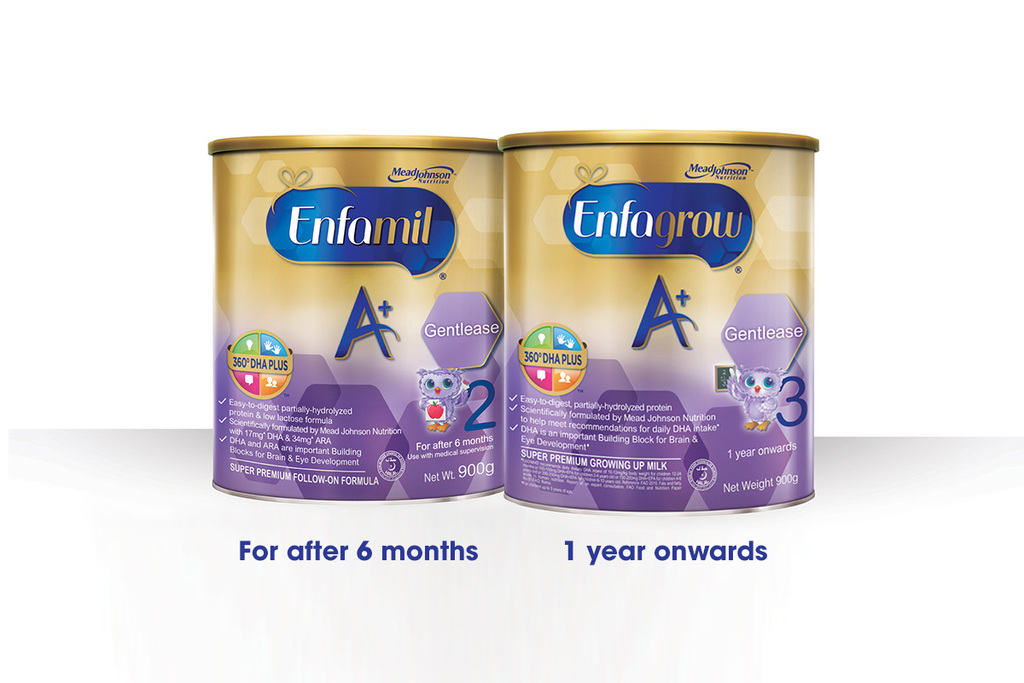SingaporeMotherhood | Baby & Toddler
February 2017
Fussy Baby? Learn How to Identify The Signs of A Delicate Tummy.

Learn how to identify the signs of a delicate tummy and turn a grumpy tummy into a happy tummy that aids your baby’s learning and development.
Beyond six months of age, is your baby unusually fussy? Uncomfortable and unsettled? Crying almost immediately after food? You might be pulling your hair out by now, but don’t worry – you’re not alone. Your child may be experiencing signs of a delicate tummy. Once you have identified it, there is plenty that you can do to help.
What is a delicate tummy?
Professor Geoff Cleghorn, Director, Mead Johnson Paediatric Nutrition Institute (Asia), explains, “Many babies experience apparent discomfort from feeding issues. This occurrence is very common as it takes time for a baby’s digestive system to fully mature as part of his developmental process.”
You’re probably thinking, “Great, but how will this affect my baby’s health?” Don’t worry, this isn’t a serious illness. Your baby is simply still developing the functionality to break down proteins as easily as you and I.
The result? An unhappy baby who isn’t quite sure what’s going on!
What are the signs I should be looking out for?
Distinguishing what is normal from abnormal is challenging for all parents and particularly scary for first time mums. So what are the signs you should be looking out for?
Grumpy Baby
Professor Cleghorn says, ”During or after feeding, your baby may appear uncomfortable and unhappy. Whilst passing gas is completely normal for most babies, it’s often caused by swallowing too much air while feeding or crying. If your baby doesn’t successfully manage to burp the air back up it will continue down the digestive tract, possibly causing your little one’s tummy to bloat and making him or her uncomfortable.”
Spitting Up
“Spitting up is a common occurrence for a baby as the one-way valve (lower esophageal sphincter) at the top of the stomach may take time to function after birth,” says Professor Cleghorn. Excessive spit-up will cause baby to become extremely fussy, cry intermittently and sometimes become inconsolable.
Will my baby always have a “delicate tummy”?
“Not at all”, advises Professor Cleghorn. “Over time most children will outgrow their digestive discomfort, usually towards the end of the first year of life. It simply takes time for his or her digestive system to develop and become fully functional, and every baby will develop at a different rate.”
How do I help my baby get the nutrients he needs and continue to thrive?
Professor Cleghorn suggests finding a milk formula designed to support your child’s nutritional needs through the different stages of development. “Milk formulas with nutrients like docosahexaenoic acid (DHA) and arachidonic acid (ARA) help support brain development.” DHA and ARA are important building blocks for the development of the brain and eyes in infants.
Find out more about Enfamil A+ Gentlease Stage 2 and how it will support your baby below.
What is Enfamil A+ Gentlease Stage 2 and how will it support my baby?
With over 100 years of experience in paediatric nutrition, Mead Johnson Nutrition has scientifically formulated Enfamil A+ Gentlease Stage 2 with 360° DHA PLUS for children above six months of age, formulated with easy-to-digest partially hydrolyzed protein & low lactose, so it’s gentler on your baby’s delicate tummy. This formula provides balanced nutrition for supporting growth and development. Scientifically formulated with 17mg DHA & 34mg ARA per 100kcal, it helps meet recommendations◆ for infants aged 6-12 months.
Also available: Enfagrow A+ Gentlease Stage 3 for children above one.
To learn more about supporting your child’s and his delicate tummy’s development, please click here.
◆ FAO/WHO recommends daily dietary DHA intake of 10-12mg/kg body weight for infants 6-12 months. Reference: FAO 2010. Fats and fatty acids in human nutrition. Report of an expert consultation. FAO Food and Nutrition Paper No.91.FAO: Rome.
Expert Resource:
Professor Geoff Cleghorn
MD, FRACP, FACG, FQA
Director, Institute of Health & Biomedical Innovation – Centre for Children’s Research Centre
Professor of Child Health
Queensland University of Technology
Director, Mead Johnson Pediatric Nutrition Institute (Asia)
This is a sponsored post.
All content from this article, including images, cannot be reproduced without credits or written permission from SingaporeMotherhood.
Follow us on Facebook, Instagram, and Telegram for the latest article and promotion updates.











